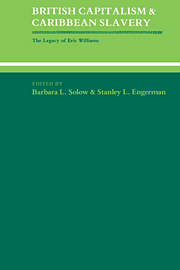Book contents
- Frontmatter
- Contents
- List of Contributors
- Preface
- British Capitalism and Caribbean Slavery: The Legacy of Eric Williams: An Introduction
- Part I Slavery as an Economic Phenomenon
- Part II Caribbean Slavery and the Industrial Revolution
- Part III The Decline of the British West Indies
- Part IV The Basis of Abolition and Emancipation
- Paradigms Tossed: Capitalism and the Political Sources of Abolition
- Capitalism, Abolitionism, and Hegemony
- Eric Williams and Abolition: The Birth of a New Orthodoxy
- What and Who to Whom and What: The Significance of Slave Resistance
- Part V Capitalism and Slavery in Historical Perspective
What and Who to Whom and What: The Significance of Slave Resistance
Published online by Cambridge University Press: 15 December 2009
- Frontmatter
- Contents
- List of Contributors
- Preface
- British Capitalism and Caribbean Slavery: The Legacy of Eric Williams: An Introduction
- Part I Slavery as an Economic Phenomenon
- Part II Caribbean Slavery and the Industrial Revolution
- Part III The Decline of the British West Indies
- Part IV The Basis of Abolition and Emancipation
- Paradigms Tossed: Capitalism and the Political Sources of Abolition
- Capitalism, Abolitionism, and Hegemony
- Eric Williams and Abolition: The Birth of a New Orthodoxy
- What and Who to Whom and What: The Significance of Slave Resistance
- Part V Capitalism and Slavery in Historical Perspective
Summary
The essence of Capitalism and Slavery for most of its readers—what is commonly termed “the Williams thesis”—is the book's concern with the degree to which the origins, the nature, and, most of all, the ending of formal slavery were determined by global economics. The twelfth and last chapter of Capitalism and Slavery, however, does not fit comfortably into this restricted view of Williams's ideas, and therefore tends to be ignored.
Unlike the rest of Capitalism and Slavery, Chapter 12 deals almost exclusively with the colonies rather than the metropolis, to show the ways in which “the colonists themselves were in a ferment which indicated, reflected, and reacted upon the great events in Britain” In broad terms, it concentrates on questions of political power and expediency rather than on economics and abstract humanitarianism. In Chapter 12, Eric Williams argues that, quite apart from economic or moral considerations, metropolitan legislators became concerned with the way that both slave unrest and plantocratic recalcitrance jeopardized the very fabric of British imperialism in the West Indies. As the slavery debate intensified in the metropolis, it exacerbated the existing tension between masters and slaves within the colonies. Planters tightened their repressive system and openly threatened secession if slavery were decreed abolished, while the slaves responded by an escalating series of plots and open rebellions, climaxing in the Jamaican Christmas Rebellion of 1831–32. “In 1833, therefore, the alternatives were clear,” concludes Williams: “emancipation from above, or emancipation from below. But EMANCIPATION.”
- Type
- Chapter
- Information
- British Capitalism and Caribbean SlaveryThe Legacy of Eric Williams, pp. 259 - 282Publisher: Cambridge University PressPrint publication year: 1988
- 1
- Cited by

